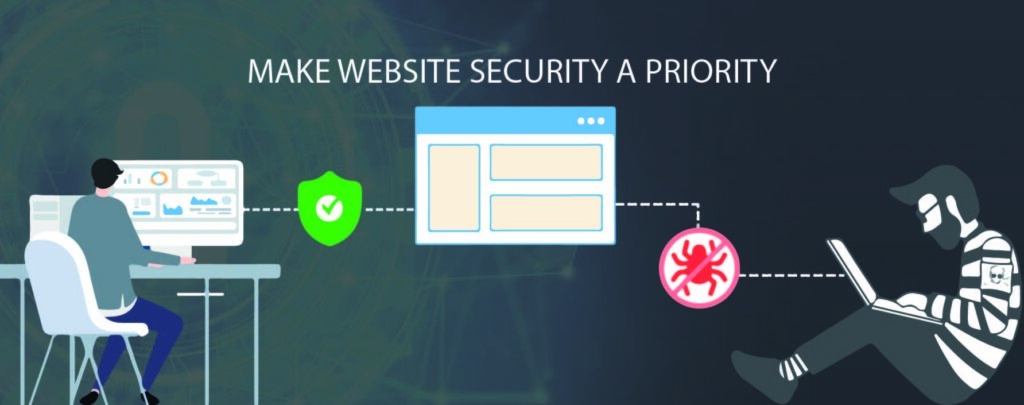
Table of Contents
ToggleEach year, around 43% of cyberattacks target small firms. And 46% of the attacks expressly target firms with 1,000 or fewer employees. Cybercriminals are continuously looking for vulnerabilities in websites that they may attack. This is why it is critical for businesses to select a website security solution that can assist them in protecting their websites from hackers. A Website Security Tester service provides a set of tools and services that assist safeguard your website from internet attacks. These services commonly include vulnerability scanning, virus scanning, DDoS defence, and others.
In this Blog, we will discuss some of the most frequent security risks. Then, we’ll walk you through the essential criteria to consider when selecting a Website Security service.
Why Does Your Site Need Website Security?
Website Security Tester is critical for safeguarding your website, its users, and your business. By taking efforts to safeguard your website, you may assist avoid cyber attacks and protect its reputation. If your website is not secure, it may face any of the following consequences:

Ransomware
Ransomware is a type of malicious software that can encrypt data or prevent you from accessing your computer or network. The attackers demand a ransom, typically in cryptocurrency, to supply the decryption key or restore access. It can target people, corporations, or organisations, resulting in data theft, financial extortion, and reputational harm.
Malware
Malware is a wide word that includes dangerous software such as viruses, worms, trojan horses, spyware, adware, and others. Once it infects your devices, it has the potential to steal valuable information, disrupt operations, and spread to other systems. Malware frequently enters the system via malicious downloads, infected email attachments, or hacked websites.
Phishing
Phishing is a cyberattack tactic in which attackers impersonate trustworthy sources such as websites, organisations, or persons in order to trick victims into disclosing sensitive information such as login passwords, credit card information, or personal data. These attempts are frequently made using emails, instant messaging, or social engineering techniques. The goal is to fool recipients into clicking on harmful links or disclosing personal information, which can lead to identity theft, financial fraud, or unauthorised access to accounts.
SQL Injection
SQL injection is a sort of vulnerability in online applications in which attackers modify input fields to insert malicious SQL code into the website’s database. If the website is not properly protected, the injected SQL code can be run, allowing for unauthorised access, data theft, or database modification. These attacks target coding flaws and poor input validation, posing a major danger to websites that employ SQL databases.
DDoS attacks
DDoS (Distributed Denial of Service) assaults aim to overwhelm your website with excessive traffic from several sources. Its purpose is to render your website unavailable to genuine visitors, resulting in interruptions and outages. Attackers carry out these assaults via networks of hacked devices (known as botnets), which can vary in size and sophistication.
Important factors to consider while selecting a website security tester service
When selecting a Website Security Tester service, it is critical to evaluate a variety of aspects to guarantee your website is well-protected. Here are a few crucial points to consider:

Security features
The security features provided by a website security service are critical for protecting your website from numerous dangers. Look for a service that provides a variety of security methods, including
SSL Certificate
SSL (Secure Socket Layer) certificates encrypt data sent between your website and users’ browsers, guaranteeing secure communication and safeguarding critical information like login passwords.
Web application firewalls (WAF)
WAFs give an extra degree of security by screening and monitoring HTTP/HTTPS traffic to your website. They can assist protect against typical web application assaults.
Backup and Restoration
Regular backups of your website’s data and files are critical in the event of data loss or website breach. A website security company should provide backup and restoration services to assist you recover your website fast if problems arise.
DDoS protection
Distributed Denial of Service (DDoS) assaults can overload your website’s server with traffic, resulting in downtime and service disruptions. To mitigate such assaults, a trustworthy security company should have DDoS protection methods in place.
Security monitoring
Real-time monitoring of your website’s security is critical for detecting and responding to threats quickly. Look for a company that provides security monitoring services to detect potential weaknesses or unusual activity.
Customer Support
In the event of a security incident or a technical problem, prompt and skilled customer service is critical. Choose a website security company that provides quick and simple access to support specialists who can help you solve problems and answer concerns.
Ongoing protection
Effective website security necessitates ongoing monitoring and defense. Following a security incident or cleaning, it is critical to avoid reinfections and future threats. Look for a service that offers continuing protection and security steps to reduce the likelihood of recurrence.

Conclusion
Securing your online assets is critical in the constantly shifting digital marketplace of 2024. As we negotiate an ever-increasing array of cyber risks, selecting the correct partner, such as our cutting-edge Website Security Tester is more than simply a tool; it provides peace of mind. Our service provides a unique experience, cutting-edge technology, and custom solutions to fit your specific business requirements. Do not take your website’s security lightly. Take proactive actions today to strengthen your digital security and keep up with possible threats. Trust our service to provide your company with confidence in its online security, allowing you to focus on what matters: generating development, engaging consumers, and achieving success in tomorrow’s dynamic online marketplace.
1. Automation enhances agility and eliminates false positives.
2. The application’s visibility is not limited or restricted.
3. Additionally, manual testing tools are available.
4. Reports are timely and customised.
5. An intelligent gadget with learning capabilities.
6. Integration with WAF provides increased security.
Web Application Vulnerability Scanners are automated programmes that inspect online applications, often from the outside, for security flaws such as cross-site scripting, SQL injection, command injection, path traversal, and unsafe server setup.





